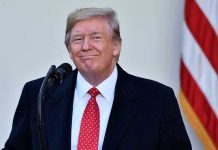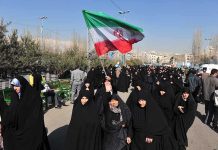
A direct federal threat to override state and local authority in Chicago has ignited a showdown between President Trump and Democratic leaders, raising the stakes for constitutional rights and public safety.
Story Highlights
- Trump vows to deploy National Guard troops to Chicago after a violent holiday weekend, despite fierce opposition from Illinois officials.
- The confrontation spotlights the battle over states’ rights, federal power, and the limits of military involvement in domestic law enforcement.
- Legal experts warn of constitutional risks, while local leaders accuse the Trump administration of political overreach.
- No troops have entered Chicago yet, but preparations and rhetoric on both sides are escalating rapidly.
Trump’s National Guard Threat Sparks Federalism Crisis in Chicago
President Donald Trump’s announcement to deploy National Guard troops to Chicago has triggered a high-stakes conflict with Illinois Governor J.B. Pritzker and Chicago Mayor Brandon Johnson. Trump’s move follows a bloody Labor Day weekend in which at least eight were killed and dozens wounded in city shootings. He accused local leadership of failing to control crime and declared, “We’re going in. I didn’t say when.” Both Pritzker and Johnson swiftly rejected federal intervention, directing local law enforcement not to cooperate and defending state sovereignty.
This tense standoff reflects deeper constitutional questions. Federal intervention in local law enforcement is rare and fraught with legal hurdles, governed by the Posse Comitatus Act and the Insurrection Act. Trump’s team, reportedly preparing to deploy Texas National Guard and other armed personnel, faces direct resistance from Illinois officials. Recent court rulings against similar deployments—such as Trump’s use of troops in Los Angeles—underscore the legal uncertainty and the potential for a constitutional showdown between federal and state powers.
Legal and Political Tensions Escalate Over Federal Authority
Legal scholars and political analysts highlight the historic gravity of Trump’s threat. The use of military force as a law enforcement tool in a major U.S. city challenges established limits on presidential power. The Posse Comitatus Act restricts military involvement in civilian law enforcement unless specific legal criteria are met. A recent federal ruling found Trump’s prior deployment of troops in Los Angeles violated this act, casting doubt on the legality of similar action in Chicago. At the same time, Trump frames his intervention as a law-and-order response to chronic violence, appealing to voters demanding decisive action.
Illinois officials, however, argue that such intervention undermines local autonomy and civil rights, with Pritzker labeling Trump’s rhetoric and actions as insulting to Chicagoans. Mayor Johnson’s executive order instructing police not to assist federal troops further intensifies the standoff. This situation echoes past disputes during the Trump administration, such as Operation Legend in 2020 and controversial National Guard deployments in 2025, which sparked legal challenges and public protests.
Implications for Constitutional Rights and American Communities
The immediate risk is a direct confrontation between federal troops and local authorities, with Chicago residents potentially caught in the crossfire. Legal experts warn of a looming constitutional crisis, as both sides escalate preparations without clear legal resolution. The broader implications include disruption to local governance, erosion of trust between communities and law enforcement, and intensified national debates over the limits of presidential authority. Immigrant communities in particular face heightened fears, given the anticipated involvement of federal agencies like ICE in broader enforcement actions.
Trump escalates fight with Pritzker as bloody Chicago weekend sparks troop warning https://t.co/5FMURWuxnk
— Fox News Politics (@foxnewspolitics) September 3, 2025
For conservatives frustrated by years of unchecked crime, government overreach, and attacks on traditional values, this confrontation represents both a test and an opportunity. While Trump supporters see the move as a necessary step to restore order, critics warn it could set a dangerous precedent for federal intervention in local affairs. As the legal and political battle unfolds, Americans across the nation are watching closely, recognizing that the outcome will shape the balance of power, the integrity of constitutional rights, and the future of federal-state relations.
Sources:
Trump threatens National Guard deployment to Chicago after violent weekend (Axios)
Pritzker Responds to Trump’s Troop Deployments & Immigration Raids in Illinois (Democracy Docket)
President says he will deploy National Guard troops to Chicago (Military Times)




